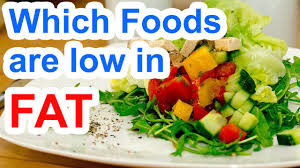
A low-fat diet is a diet that restricts the daily consumption of dietary fat from animal and plant sources. The daily fat consumption is 30% of the total daily calorie intake. So, if you are on a 1500-calorie diet, you may consume no more than 450 calories from fat or about 44 g of fat per day. The new fat intake guidelines allow saturated fats consumption no more than 10% of calories, and trans fats no more than 1% of calories, and urges to replace saturated fats with mono and polyunsaturated fats.
Low Fat Foods To Eat
- Healthy Fats –Olive oil, avocado, avocado oil, walnut, almond, pistachio, chia seeds, flax seeds, peanut butter, almond butter, pepita, and ghee.
- Veggies –Carrot, broccoli, cabbage, Chinese cabbage, beetroot, bok choy, scallions, radish, kale, spinach, radish greens, chard, rhubarb, tomato, cucumber, squash, bitter gourd, bottle gourd, onion, okra, eggplant, and cherry tomatoes.
- Fruits –Avocado, apple, pineapple, peach, plum, orange, tangerine, lemon, lime, and sweet lime.
- Beverages –Water, homemade buttermilk, green tea, herbal tea, black coffee (avoid if you are caffeine sensitive), and freshly pressed fruit juice or smoothies without added sugar or sugar-free.
- Herbs And Spices –Cilantro, oregano, garlic, ginger, dill, fennel, cumin, coriander, turmeric, mace, saffron, nutmeg, cinnamon, cardamom, allspice, chili flakes, cayenne pepper, sage, basil, and star anise.
- Protein –Fish, skinless chicken breast, eggs, mushroom, tofu, soybean, soya chunk, lentils, kidney beans, sprouts, chickpeas, Bengal gram, peas, and edamame.
- Dairy –Low-fat milk, low-fat yogurt, and low-fat cheese in limited amounts. *full-fat dairy would be the best choice for weight loss. Please consult your dietitian to know if you should consume low-fat or high-fat dairy.
Foods Not To Eat
- Dairy –Cream cheese.
Beverages – Packaged fruit juice, packaged smoothies, soda, diet soda, and packaged buttermilk.
- Junk Food –Fried foods, frozen foods, zero-calorie drinks, soda, refined sugar, and processed foods.
- Protein –Fatty part of beef and pork.
FOOD TYPE FOODS THAT CAN BE EATEN REGULARLY (LITTLE OR NO FAT AND/OR ‘HEALTHY’ FOODS)FOODS TO BE EATEN IN MODERATIONFOODS TO AVOID OR TO EAT RARELY (HIGH IN FAT AND/OR ‘UNHEALTHY’ FOODS)
Wholemeal flour and bread
Porridge oats
High-fibre breakfast cereals
Wholegrain rice and pastaWhite flour and bread
Low-fibre breakfast cereals
White rice and pasta
Plain biscuits
Plain or fruit sconesCroissants
Fried bread
Most cakes and biscuits
Pastries
Suet pudding
Fruit, veg and nuts
All fruits and vegetables
Dried beans and lentils
Baked potatoes
Dried fruit
WalnutsOven chips
Avocados
Olives
Almonds
Pecans
HazelnutsChips
Fried or roast potatoes
Fried, creamed, buttered or cheesed vegetables
Crisps and potato snacks
Coconut
Brazils
Roasted peanuts
Fish
Fresh salmons, herring, mackerels, tuna, sardines etc, white fishShellfishFish roe
Caviar
Meat
Lean meats without skin, such as chicken and other poultryLean ham, beef, pork, and lamb
Lean mince
Liver and kidneyVisible fat on meat
Crackling
Sausages
Pâtés
Duck, goose
Meat pies/pasties
Eggs, dairy foods
Skimmed or semi-skimmed milk
Cottage or curd cheese
Low-fat yoghurt
Egg whitesEdam
Camembert
Parmesan
Up to 3 egg yolks a weekWhole milk
Cream
Ice cream
Most hard cheeses
Chocolate
Cream cheese
Fats and spreads
NoneLow-fat spreads
Margarine high in polyunsaturates
Corn oil, sunflower oil and olive oilButter
Dripping and lard
Margarine not high in polyunsaturates
Drinks and soups
Tea and coffee
Mineral water
Fruit juicesPacket soups
Alcoholic drinksCream soups
Milky drinks
Sugary drinks
